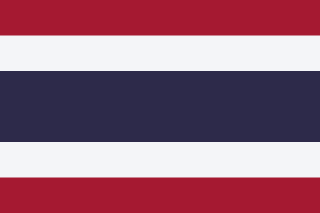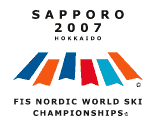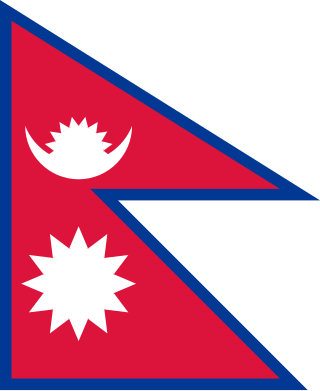
Nordic combined at the 2002 Winter Olympics, consisted of three events held over ten days, from 9 February to 22 February. The ski jumping part took place in Park City, while the cross-country part took place in Soldier Hollow. This was the first Winter Olympics to have two individual Nordic Combined events: the 7.5 km individual normal hill (sprint) and the 15 km individual large hill (individual).

Nordic combined is a winter sport in which athletes compete in cross-country skiing and ski jumping. The Nordic combined at the Winter Olympics has been held since the first Winter Olympics in 1924, while the FIS Nordic Combined World Cup has been held since 1983. Many Nordic combined competitions use the Gundersen method, where placement in the ski jumping segment results in time (dis)advantages added to the contestant's total in the cross-country skiing segment.

The FIS Nordic World Ski Championships is a biennial Nordic skiing event organized by the International Ski Federation (FIS). The World Championships was started in 1925 for men and opened for women's participation in 1954. World Championship events include Nordic skiing's three disciplines: cross-country skiing, ski jumping, and Nordic combined. From 1924 to 1939, the World Championships were held every year, including the Winter Olympics. After World War II, the World Championships were held every four years from 1950 to 1982. Since 1985, the World Championships have been held in odd-numbered years.

Switzerland competed at the 2006 Winter Olympics in Turin, Italy. This was the confederation's largest Winter Olympics team ever, because two ice hockey teams qualified.

Thailand sent a delegation to compete at the Winter Olympic Games for the first time at the 2002 Winter Olympics in Salt Lake City, United States from 8–24 February 2002. The delegation consisted of a single representative, cross-country skier Prawat Nagvajara. He failed to finish the 30 kilometre freestyle mass start and placed 67th in the sprint

Finland competed at the 2002 Winter Olympics in Salt Lake City, Utah, United States. The nation won all Nordic combined events, most notably Samppa Lajunen, in the individual events.

The Nordic combined events have been contested at the Winter Olympic Games since 1924. The first competition involved 18 km cross-country skiing, followed by ski jumping.

Johnny Spillane is an American athlete who competes in Nordic combined, a combination event consisting of ski jumping and cross-country skiing. Spillane is a world champion and three-time Olympic silver medalist. He announced his retirement from Nordic combined on April 18, 2013.

The FIS Nordic World Ski Championships 2001 took place February 15–25, 2001 in Lahti, Finland for a record sixth time, previous events being held in 1926, 1938, 1958, 1978 and 1989. These championships also saw the most event changes since the 1950s with the 5 km women and 10 km men's events being discontinued, the 10 km women and 15 km men's events return to their normal status for the first time since the 1991 championships, the debut of a combined pursuit as a separate category, the addition of the individual sprint race for both genders, and the debut of the ski jumping team normal hill event. Extremely cold weather cancelled the women's 30 km event. The biggest controversy occurred when a doping scandal hit the host nation of Finland, resulting in six disqualifications. This would serve as a prelude to further doping cases in cross country skiing at the Winter Olympics in Salt Lake City the following year.

The FIS Nordic World Ski Championships 2007 took place 22 February – 4 March 2007 in Sapporo, Japan. It was the second time this city has hosted these championships, having previously done so in the 1972 Winter Olympics. Sapporo was selected as venue by vote at the 43rd FIS World Congress in Portorož, Slovenia, on 6 June 2002. It also marked the third time the championships were hosted outside Europe in a year that did not coincide with the Winter Olympics; it was the first championship held in Asia. The ski jumping team normal hill event was not held, as it had been in 2005.

Kenya sent a delegation to compete at the 2002 Winter Olympics in Salt Lake City, United States from 8–24 February 2002. The delegation consisted of one cross-country skier, Philip Boit, who was appearing in his second Olympics, and was, at the time, Kenya's only Winter Olympian in history. His best performance was 65th place in the men's sprint.

Nepal sent a delegation to compete at the 2002 Winter Olympics in Salt Lake City, United States from 8–24 February 2002. This was Nepal's first time participating in a Winter Olympic Games. The delegation consisted of a single cross-country skier, Jay Khadka. In the men's sprint he finished in 70th place, and in the men's 2 × 10 kilometre pursuit he finished in 79th place, and did not advance to the finals of either event.

Cameroon sent a delegation to compete at the 2002 Winter Olympics in Salt Lake City, United States from 8–24 February 2002. This was the nation's first appearance at a Winter Olympic Games. Cameroon sent only one representative, cross-country skier Isaac Menyoli. He finished the sprint in 65th place and the 2 × 10 kilometre pursuit in 80th position.
The Men's sprint Nordic combined competition for the 2006 Winter Olympics was held in Pragelato, Italy. It took place on 21 February.

For the 1980 Winter Olympics in Lake Placid, New York, United States, a total of seven sports venues were used. All five of the venues used for the 1932 Winter Olympics were also used at the 1980 Winter Games with adjustments. These adjustments included electronic scoreboards, increased refrigeration, and the addition of a separate luge track. This was the last Winter Olympics where there were separate bobsleigh and luge tracks. The closest finish in Olympic history in cross-country skiing led skiing officials to time future events in hundredths of a second rather than tenths of a second. This would also apply to biathlon events. Eric Heiden won five gold medals at the speed skating oval while the "Miracle on Ice" took place between Americans and Soviets at the Olympic Center. In the late 1990s, the luge track was demolished and a new combination track was constructed in time for the only Winter Goodwill Games held. The sliding venue was named to the American National Register of Historical Places in February 2010.
The Men's team Nordic combined competition for the 2002 Winter Olympics was held in Park City & Soldier Hollow, United States. The ski jumping part took place on February 16, and the cross-country race on February 17.
LW5/7 is a standing para-alpine and para-Nordic skiing classification for skiers with upper extremity issues in both limbs that may include double amputation of both arms and hands or dysmelia of the upper limbs. The class has three subclasses defined by the location of the disability on the upper extremities. International classification is done by IPC Alpine Skiing and IPC Nordic Skiing. On the national level, classification is handled by national sports federation such as Cross-Country Canada.
The men's individual Nordic combined competition for the 2002 Winter Olympics in Salt Lake City at Utah Olympic Park and Soldier Hollow on 9 and 10 February.














